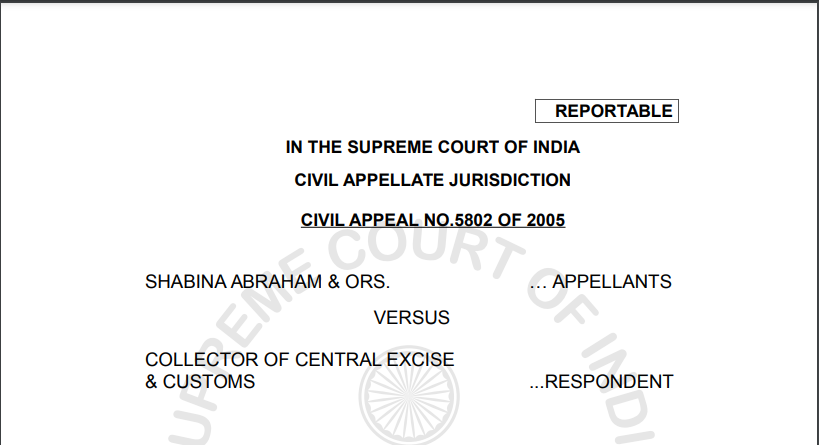Supreme Court in the case of Shabina Abraham Versus Collector of Central Excise & Customs
Table of Contents
Case Covered:
Shabina Abraham
Versus
Collector of Central Excise & Customs
Facts of the Case:
“Nothing is certain except death and taxes.” Thus spake Benjamin Franklin in his letter of November 13, 1789, to Jean Baptiste Leroy. To tax the dead is a contradiction in terms. Tax laws are made by the living to tax the living. What survives the dead person is what is left behind in the form of such person’s property. This appeal raises questions as to whether the dead person’s property, in the form of his or her estate, can be taxed without the necessary machinery provisions in a tax statute. The precise question that arises in the present case is whether an assessment proceeding under the Central Excises and Salt Act, 1944, can continue against the legal representatives/estate of a sole proprietor/manufacturer after he is dead. The facts of the case are as follows.
Related Topic:
Supreme Court in the case of Tata Consultancy Services Limited Versus Cyrus Investments Pvt. Ltd.
One Shri George Varghese was the sole proprietor of Kerala Tyre and Rubber Company Limited. By October 1985, this proprietary concern had stopped the manufacture and production of tread rubber. By a show-cause notice dated 12.6.1987, for the period January 1983 to December 1985, it was alleged that the assessee had manufactured and cleared tread rubber from the factory premises by suppressing the fact of such production and removal with an intent to evade payment of excise duty. The provisions of Section 11A, as they then stood, of the Central Excises and Salt Act were invoked and duty amounting to Rs.74,35,242/- was sought to be recovered from the assessee together with the imposition of penalty for clandestine removal.
Related Topic:
Supreme Court in the case of Rajeev Suri Versus Delhi Development Authority
On 14.3.1989, the said Shri George Varghese died. As a result of his death, a second show-cause notice was issued on 18.10.1989 to his wife and four daughters asking them to make submissions with regard to the demand of duty made in the show cause notice dated 12.6.1987. By their reply dated 25.10.1989, the said legal heirs of the deceased stated that none of them had any personal association with the deceased in his proprietary business and were not in a position to locate any business records. They submitted that the proceedings initiated against the deceased abated on his death in the absence of any provision in the Central Excises and Salt Act to continue assessment proceedings against a dead person in the hands of the legal representatives. The said show cause notice was, therefore, challenged as being without jurisdiction.
Related Topic:
Supreme Court Ends ‘Extension Of Limitation’
Observations of the Hon’ble Court:
It is clear on a reading of the aforesaid paragraph that what revenue is asking us to do is to stretch the machinery provisions of the Central Excises and Salt Act, 1944 on the basis of surmises and conjectures. This we are afraid is not possible. Before leaving the judgment in Murarilal’s case (supra), we wish to add that so far as partnership firms are concerned, the Income Tax Act contains a specific provision in Section 189(1) which introduces a fiction qua dissolved firms. It states that where a firm is dissolved, the Assessing Officer shall make an assessment of the total income of the firm as if no such dissolution had taken place and all the provisions of the Income Tax Act would apply to the assessment of such dissolved firm. Interestingly enough, this provision is referred to only in the minority judgment in M/s. Murarilal’s case (supra).
Related Topic:
Supreme Court in the case of Paramvir Singh Saini Versus Baljit Singh
The argument that Section 11A of the Central Excises and Salt Act is a machinery provision that must be construed to make it work can be met by stating that there is no charge to excise duty under the main charging provision of a dead person, which has been referred to while discussing Section 11A read with the definition of “assessee” earlier in this judgment.
Related Topic:
Supreme Court on Doctrine of Frustration and Force majure
The Decision of the Court:
This Court has, in a plethora of judgments, referred to the aforesaid principles. Suffice it to quote from one of such judgments of this Court in Commissioner of Sales Tax Commissioner, Uttar Pradesh v. Modi Sugar Mills, 1961 (2) SCR 189 at 198:-
Related Topic:
Supreme Court in the Case of Skill Lotto Solutions Pvt. Ltd. Versus Union of India
“In interpreting a taxing statute, equitable considerations are entirely out of place. Nor can taxing statutes be interpreted on any presumptions or assumptions. The court must look squarely at the words of the statute and interpret them. It must interpret a taxing statute in the light of what is clearly expressed; it cannot imply anything which is not expressed; it cannot import provisions in the statute so as to supply any assumed deficiency.”
We are, therefore, of the view that this appeal must be allowed and the judgment of the High Court of Kerala is, accordingly set aside and that of the learned Single Judge restored.
Related Topic:
Supreme Court Overruled Cases
Read & Download the full Decision in pdf:
 ConsultEase Administrator
ConsultEase Administrator
Consultant
Faridabad, India
As a Consultease Administrator, I'm responsible for the smooth administration of our portal. Reach out to me in case you need help.








